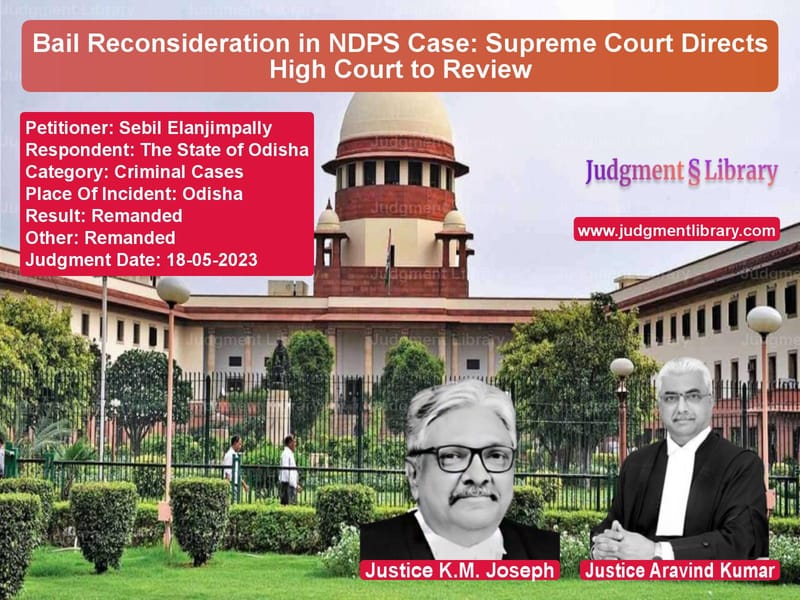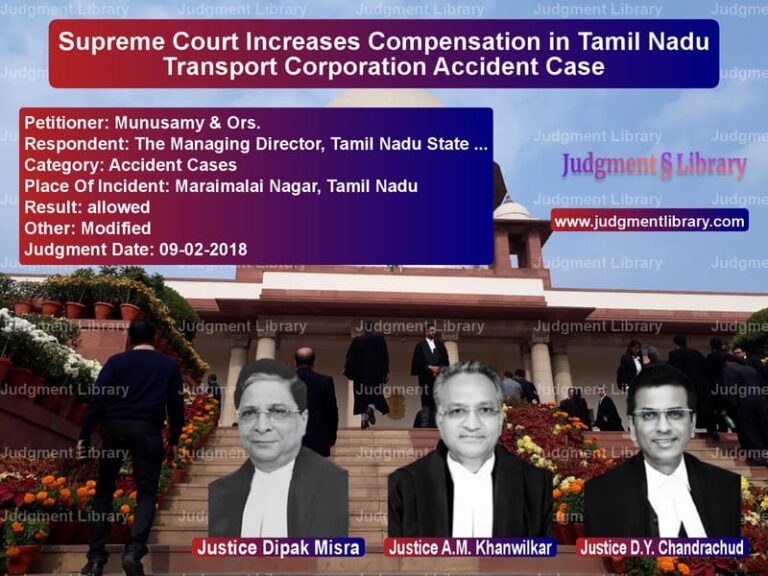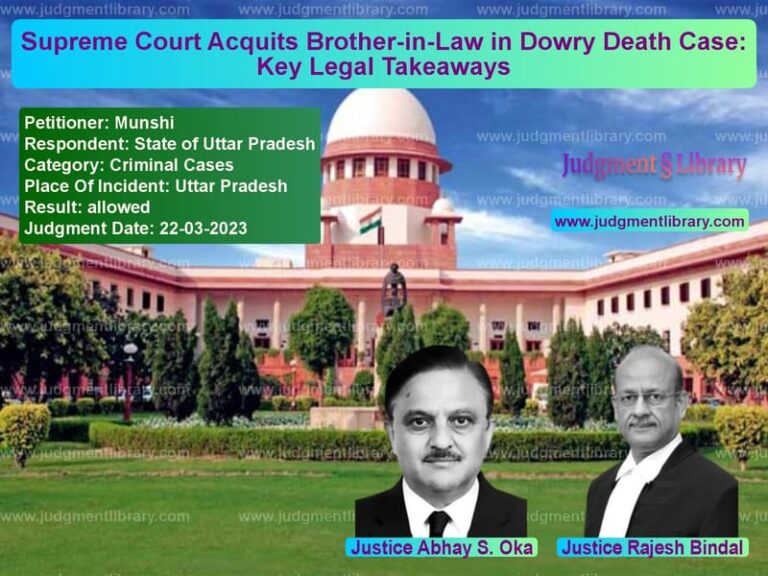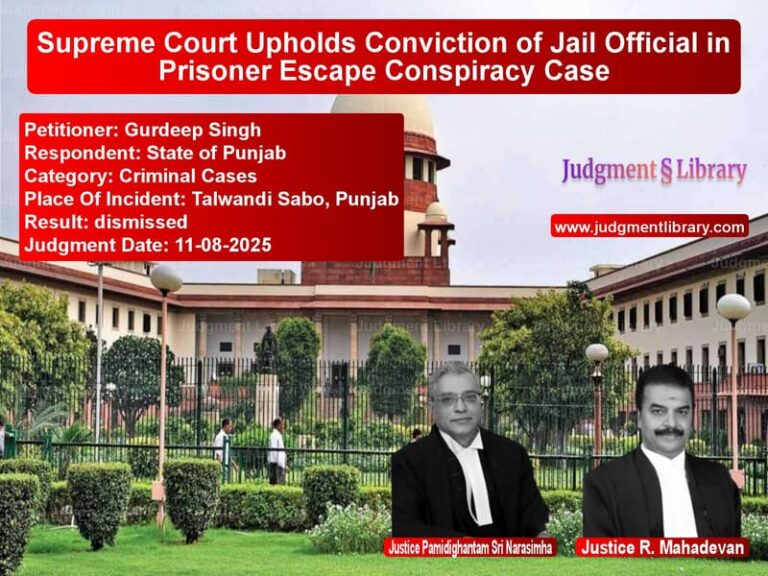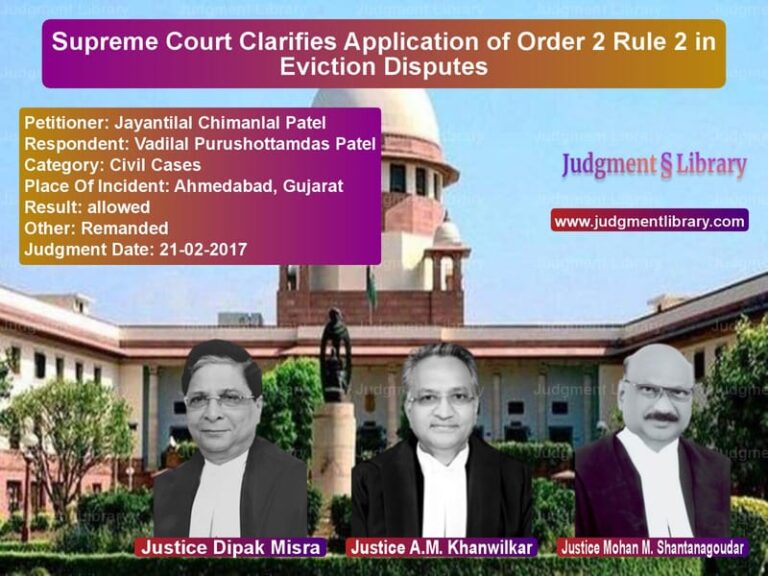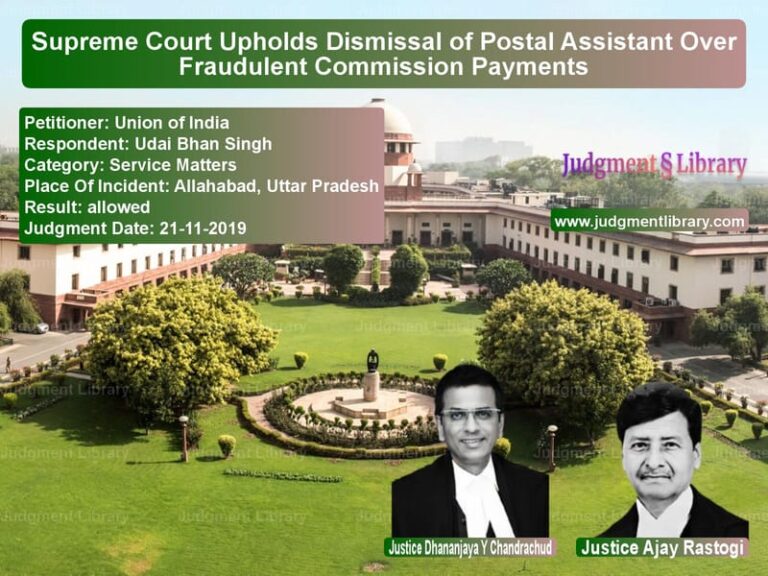Bail Reconsideration in NDPS Case: Supreme Court Directs High Court to Review
The case of Sebil Elanjimpally v. The State of Odisha revolves around a bail application under the Narcotic Drugs and Psychotropic Substances Act, 1985 (NDPS Act). The appellant had been in custody for nearly three years, seeking bail under Section 20(b)(ii)(C) of the NDPS Act, which pertains to the possession of commercial quantities of drugs. The Supreme Court was called upon to decide whether the High Court’s denial of bail, based on the non-surrender of a co-accused, was legally valid.
This case highlights the complexities involved in bail proceedings under the NDPS Act, where stringent conditions apply, and courts often take a cautious approach. The Supreme Court’s ruling emphasizes that bail decisions should be based on individual circumstances rather than the conduct of co-accused persons.
Background of the Case
The appellant had been charged under Section 20(b)(ii)(C) of the NDPS Act, which deals with offenses related to commercial quantities of cannabis. He had been in judicial custody for two years and eleven months at the time of the bail application. His first bail application had been rejected by the High Court on July 7, 2022, and the second bail application was rejected based on the reasoning that a co-accused, who had previously been released on bail, had failed to surrender.
Read also: https://judgmentlibrary.com/supreme-court-grants-probation-in-gambling-conviction-case/
After exhausting options in the High Court, the appellant approached the Supreme Court for relief, arguing that his bail application was being denied due to an irrelevant factor—the conduct of another accused person.
Petitioner’s Arguments
The appellant’s counsel made the following submissions:
- The appellant had been in custody for nearly three years without trial, violating his fundamental right to a speedy trial.
- The rejection of bail was based solely on the failure of a co-accused to surrender, which had no direct bearing on the appellant’s conduct or case.
- The trial was expected to examine 19 prosecution witnesses, which would likely extend the trial process further.
- The appellant’s father had recently undergone surgery, making his release on bail even more urgent for family support.
Respondent’s Arguments
The State of Odisha, represented by its legal counsel, opposed the bail application, arguing:
- The appellant was charged under a stringent provision of the NDPS Act, which requires courts to adopt a cautious approach to bail.
- The non-surrender of the co-accused raised concerns about possible flight risk, as both accused individuals were allegedly involved in the same drug-related offense.
- There was sufficient evidence to suggest the appellant’s involvement in a serious crime, justifying continued detention.
Supreme Court Judgment
The case was heard by Justice K.M. Joseph and Justice Aravind Kumar. The Supreme Court analyzed the reasoning behind the High Court’s order and found that the denial of bail was primarily based on the conduct of a co-accused, which was deemed an improper ground for rejection.
1. Irrelevant Considerations in Bail Rejection
The Supreme Court found the High Court’s reasoning flawed:
“The fact that the co-accused who was released on bail has not surrendered cannot be a germane factor to decline bail to the appellant.”
The Court emphasized that bail should be considered based on the merits of each individual case and that the behavior of a co-accused should not influence the decision regarding another accused.
2. Right to Speedy Trial
The Court noted that the appellant had already been in custody for nearly three years, with trial proceedings still in progress. Given the number of pending witnesses and the time required for examination, the Court expressed concerns about the prolonged detention:
“The charges have been framed, and 19 prosecution witnesses are proposed to be examined by the State.”
The Supreme Court reiterated the principle that prolonged pre-trial detention without conviction can violate fundamental rights, especially in cases where the trial is unlikely to conclude soon.
3. Directions for Reconsideration
Rather than granting bail outright, the Supreme Court opted to remand the case back to the High Court for fresh consideration. The Court directed the High Court to review the bail application on its own merits, without being influenced by the co-accused’s non-surrender.
“The appeal is allowed. The impugned order is set aside. The High Court will take up BLAPL No. 6803/2022 and pass orders on the same in view of the facts.”
Additionally, the Supreme Court urged the High Court to expedite the matter:
“We request the High Court to take up the application and dispose of the same at the earliest and, if possible, preferably within a period of two months.”
Final Verdict
The Supreme Court ruled in favor of reconsidering the appellant’s bail application, emphasizing the following key points:
- The decision to deny bail should be based on the individual circumstances of the appellant, not the conduct of other accused persons.
- The right to a speedy trial is a fundamental right, and prolonged detention without trial can be unjust.
- The High Court must conduct a fresh review and decide the bail application based on its merits.
This judgment reinforces the importance of ensuring fair legal proceedings and underscores that an accused person’s bail application should be judged independently rather than being influenced by the actions of co-accused individuals.
Petitioner Name: Sebil Elanjimpally.Respondent Name: The State of Odisha.Judgment By: Justice K.M. Joseph, Justice Aravind Kumar.Place Of Incident: Odisha.Judgment Date: 18-05-2023.
Don’t miss out on the full details! Download the complete judgment in PDF format below and gain valuable insights instantly!
Download Judgment: sebil-elanjimpally-vs-the-state-of-odisha-supreme-court-of-india-judgment-dated-18-05-2023.pdf
Directly Download Judgment: Directly download this Judgment
See all petitions in Drug Possession Cases
See all petitions in Bail and Anticipatory Bail
See all petitions in Judgment by K.M. Joseph
See all petitions in Judgment by Aravind Kumar
See all petitions in Remanded
See all petitions in Remanded
See all petitions in supreme court of India judgments May 2023
See all petitions in 2023 judgments
See all posts in Criminal Cases Category
See all allowed petitions in Criminal Cases Category
See all Dismissed petitions in Criminal Cases Category
See all partially allowed petitions in Criminal Cases Category

